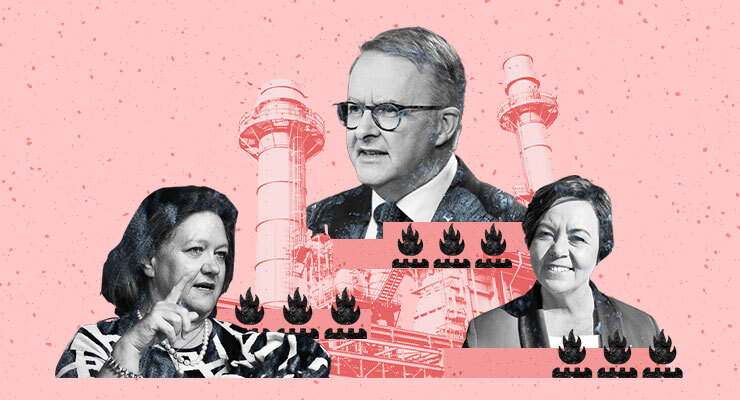
To be clear about what’s necessary to meet a goal of net zero emissions by 2050 — let alone the more urgent emissions reductions we need to prevent disastrous global warming — let’s return to last year’s International Energy Agency (IEA)’s roadmap for getting there.
As we’ve repeatedly noted, the IEA is the traditional international lobby group for fossil fuel interests.
In order to reach the unambitious 2050 net zero target, the IEA says that from 2021 there should be “no new oil and gas fields approved for development; no new coal mines or mine extensions”. It’s true that the IEA report was completed well before the global spike in energy prices caused by Russia’s attack on Ukraine, and is predicated on pre-war demand assumptions. But so rapid did the IEA see the fall in demand for gas that it went so far as to say “also not needed are many of the liquefied natural gas (LNG) liquefaction facilities currently under construction or at the planning stage”.
If the IEA report was only fit for a world before Ukraine, the sobering counter to that is that the IEA also relies on discredited carbon capture and storage technology coming to the rescue and delivering 11% of required energy by 2050. The roadmap is therefore to a destination well short of net zero.
For Labor, however, new gas fields are the path to net zero. Resources Minister Madeleine King says “without Australia’s resources sector, the world doesn’t have net zero”.
That statement is indeed correct regarding minerals needed for renewables technologies, especially copper and lithium. King’s boosterism for Australia’s abundance of renewables-related minerals is well founded. But King also backs gas and coal to “keep our lights on”. Indeed King has long been on the record as backing new gas projects.
The founding lie of Labor’s enthusiasm for expanding the gas industry is that it’s not our problem what other countries do with our fossil fuels — that’s up to them. The government has even peddled the lie that our coal is somehow, miraculously, “cleaner” than filthy foreigners’ coal.
What’s bizarre about this disowning of any responsibility for the impacts of our fossil fuels is that Australia, more than any other developed country, is on the frontline of climate impacts, as our past two years of weather disasters have shown. Australia desperately needs the rest of the world to reduce emissions, and yet we’re eagerly helping it continue business as usual with fossil fuels.
At least, Labor argues, we get money for hospitals and schools from these exports. Except we don’t — they’re exported by tax-dodging multinationals who pay no petroleum rent resource tax and minimal company tax. Labor refuses to address this massive rort despite immense fiscal pressure, for fear it may upset energy multinationals.
Along with several highly polluting new gas fields, the government will be asked to approve Gina Rinehart’s plan to expand fracking in the Surat Basin for domestic use.
The 43% domestic emissions reduction target is a sideshow — it’s our gas and coal exports that are the global problem. We know we can’t expand them any further. But Labor, like its predecessors, is unable to contemplate doing what’s needed even to reach unambitious climate targets, let alone effective ones.
Is Labor any better than the previous government when it comes to gas? Let us know your thoughts by writing to letters@crikey.com.au. Please include your full name to be considered for publication. We reserve the right to edit for length and clarity.








‘… we get money for hospitals and schools from these exports.’
Regrettably, I suspect that’s the public perception.The number of jobs generated by the gas sector would also be misunderstood.
Why risk poisoning the water table in the Surat Basin by fracking – we are the driest continent on the planet, protecting potable water is vital, it is our wealth.
Last night Shaun Micallef on Mad as Hell showed two video clips to prove that Albanese’s justification for more coal and gas is just a paraphrase of Barnaby Joyce on the same subject. Whether you find this hilarious or not is up to you.
No matter who you vote for the government gets in, as we are often told.
it was depressing, even if not unexpected
Maybe they should pay attention to the last government that sold out to fossil fuel companies and ignored climate change.
this is where the Greens and the Teals can come into play, i hope.
Politics. The art of doing nothing while appearing to do something.
The recovery Australia needs to get into involves computer chips, batteries and solar cells – both raw materials and downstream processing. That’s where the govt should be investing rather than subsidising the oil and gas barons!
Since the LNP got a bloody nose at the last election the harlots in the various lobby groups has focused their corrupt activities on Labor. Labor politicians were already groomed to be susceptible to corruption so it was an easy transition to make. Since the LNP look to be wiped out and never likely to be in power again the lobbyists can focus their full attention , and dollars, on labor.
Expect policies and actions which can only be explained if you accept the possibility of corruption.
I fear that the LNP, like Frankenstein’s monster, will rise again. In the meantime, I don’t know why I am disappointed with Albo’s mob’s piss-weak stance on fossil fuel mining. I am certainly old enough to know that anyone who wants to be a politician does not deserve my vote. Or as my old Dad used to say: “Son, if you find an honest pollie, shoot the bastard before he goes bad!” So next election, my conscience will prevent me voting for the LNP, Labor and the Greens. Maybe Pauline will come up with a reasonable platform to combat climate change…or maybe Barilaros will fly??
Care to outline your problem with The Greens?